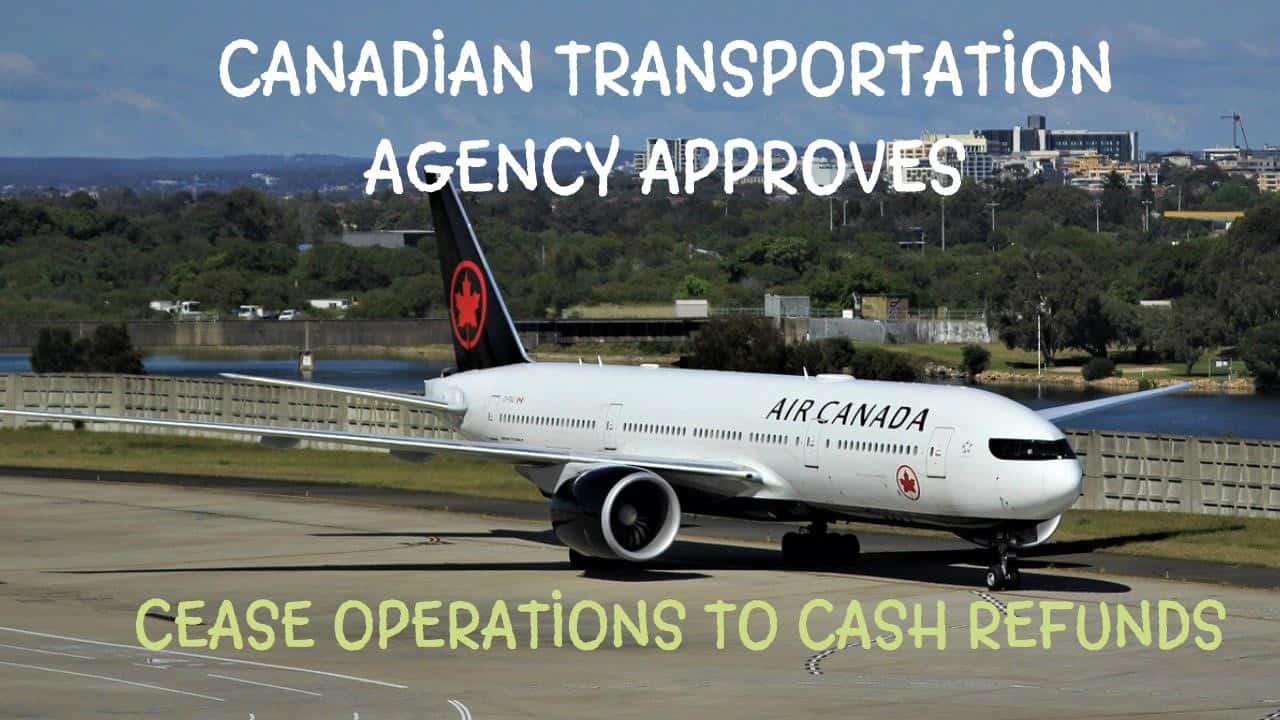If you would prefer to listen to the audio version of this Brandon’s Blog, please scroll to the bottom of this page and click on the podcast.
Introduction
As a result of the unprecedented situation caused by the COVID-19 pandemic, global airlines have either suspended operations entirely or are flying a shadow of their former schedule. Travellers are clamouring to get their money back. People who cannot work due to the coronavirus pandemic, need their money back to buy groceries or make their next rent or mortgage payment. While the Canadian government is working at warp speed to try to make things financially better for Canadians in the face of this virus crisis, it has also given the Canadian Transportation Agency the approval to give the airlines the clear for takeoff to ground your cash refund.
In this Brandon’s Blog, I describe how the government has given the airlines the green light to red light your refund and provide some useful suggestions.
The contract of carriage
Practically every country shut its borders to outsiders. On March 13, 2020, the Government of Canada provided a blanket travel advisory against all non-essential travel outside of Canada. Airlines, in action to the travel limitation, have cancelled trips. The friendly skies are a lot quieter these days.
When you purchase a flight you become a party to the airline’s contract of carriage. It is full of the usual legalese that you don’t read and just click accept as fast as you can. You do this because you really want to buy the ticket and you are afraid of losing that special reduced fare. It is a contract that sets out obligations between the airline and you and what happens in various events such as delay, cancellation by the airline and cancellation by the passenger.
The initial response of the airlines to COVID-19
Early on, the COVID 19 virus was just something that happened in China. It wasn’t something close to home. As the COVID-19 situation unfolded, the airlines implemented a number of policy changes to try to instill consumer confidence in members of the public who were thinking of voluntarily choosing not to fly. Most waived change penalties and allowed customers to seek credit for a future flight.
Most airlines became generous and allowed credit for even the most restrictive tickets, ones that normally become worthless when the passenger cancels. But what if the passengers didn’t proactively cancel and are left holding tickets for flights that aren’t operating because of the airlines, for one reason or another, cancelled on the passenger? Canadians are wondering now what happens to their money, at a time where they are already worried about an uncertain economic landscape.
Then the Canadian Transportation Agency changed everything
It is generally accepted under most contracts of carriage that when an airline cancels your flight they need to rebook you or provide a refund back to the original payment. COVID-19 has put all airlines in a liquidity crisis and they, like everyone else, need to conserve their cash. So, they do not want to give refund payment for all the cancelled flights. Especially with little to no revenue coming in right now.
Then the Canadian Transportation Agency came out with some important announcements. They were framed as public service announcements in keeping their staff and the general public safe from the coronavirus.
In reality, it is to help Canada’s airline industry. I am not saying that protecting Canada’s airlines is unnecessary or wrong, it isn’t. It just works against Canadians who need to be counting every penny. The announcements are:
- Exempting the airlines from having to pay additional compensation to anyone whose flight was either delayed or cancelled.
- Paused the dispute resolution mechanism between airlines and passengers until June 30, 2020. While passengers can continue to submit complaints, nothing is going to be done with them. The June 30 date is also subject to extension, depending on circumstances at that time.
- Canadian regulations concerning the conduct of our airlines were created in anticipation of relatively localized and temporary flight interruptions. None contemplated the kind of global mass flight terminations that have taken place over recent weeks as a result of the pandemic. It is necessary to consider just how to strike a reasonable and also sensible balance between airlines and their passengers in these remarkable and also unprecedented situations. They went on to say that in general, a suitable method in the existing context could be for airlines to provide affected travellers with coupons or credits for future travel, as long as the vouchers or credits do not expire in an unreasonably short period of time (24 months would certainly be considered practical most of the times).
So there you have it. In one fell swoop, the Canadian government, through the Canadian Transportation Agency, sanctioned the airlines to not have to pay compensation or give people back their cash when the airline cancelled flights because of the travel bans.
What the airlines are doing
The airlines’ stance is that they are offering affected passengers a credit equal to the value paid, for use on future travel, for up to 24 months. I was one of the affected travellers. In response to an email, I received advising my flights were cancelled, my airline was insistent that I had to state, either in writing or on a recording, that I was cancelling my flight before I could receive the credit.
Hold on – I am not cancelling; the airline already cancelled my flight and my contract entitles me to a refund. The airlines are referring to the statement issued by the Canadian Transportation Agency which, after suspending hearing passenger disputes, seeks fairness amongst parties because they see the COVID-19 pandemic as a force majeure. Something outside of anyone’s control. Their guidance seeks to balance things by directing airlines to provide credit, not a refund.
So what can affected passengers do?
Customers who bought their tickets from the airline and paid by credit card may wish to attempt to initiate a chargeback. Credit card issuers are pushing back and a 3-way fight will ensue as they act as a mediator between passengers and airlines. I believe in most cases the offer of credit will be viewed as a reasonable compromise by the card issuers, in light of the Canadian Transportation Agency CTA guidance. Otherwise, they will have to either take the credit or see if they can book the same trip far enough out to guess when the “all clear” will be sounded and when they think they could get time off work to travel again.
Now, some people may think that since they bought insurance for their trip, they can claim against the policy. Wrong! If you have trip interruption insurance, that only covers you if you have already gone on at least the first leg of your journey, and are away from home. It covers your additional expenses if you need to return home sooner or later than planned and compensates you for non-refundable portions of unused, pre-paid travel arrangements.
Similarly, trip cancellation coverage also won’t help you. That coverage is in case you need to cancel your trip at the pre-departure stage. It can repay 100% of your trip price if you require to cancel your trip for a reason that is covered by the insurance.
What is so bad about credit for future travel?
So what’s so bad about a credit? When everything returns to normal, whenever that may happen, people will want to travel again and will have credit. Unfortunately, that doesn’t help anyone who really needs the money now that they paid for a vacation they can’t take anyway.
Worse, a credit, as opposed to a future confirmed reservation, is not payment for a defined service. Rather, it is your prepaid deposit and the airline’s ordinary unsecured debt to you. What if the airlines need to seek bankruptcy protection as a result of the financial stress being placed on them? What if like Air Canada bankruptcy protection, which it has already done twice before, they need to restructure under the Companies’ Creditors Arrangement Act (Canada) (CCAA). That unsecured debt could easily be compromised to the point where it either partially or totally vanishes. At least a future reservation cannot be eliminated (we hope!).
On March 27, 2020, a class-action lawsuit was filed in the Federal Court in Vancouver, B.C. It is on behalf of all Canadians who paid for flights not taken, cancelled and not refunded. The class is seeking a refund of the payment in its original form. So, if you paid by credit card, you get the cash put back on your card. If you paid in cash, you get back the cash. It will be interesting to see how that litigation eventually shakes out.
Summary
The Ira Smith Team family hopes you and your family members are remaining safe, healthy and balanced. Our hearts go out to every person who has been negatively affected either by mere inconvenience or misfortune. We salute Canada’s front line health care, police, fire emergency and safety workers.
All Canadians need to do their part to stop the spread of this infection. Social distancing and self-quarantining are sacrifices that are not optional. Unfortunately, families are separated from each other.
Ira Smith Trustee & Receiver Inc. has always employed clean and safe techniques in our professional practice. We continue to do so. We are not allowing any visitors to our office. If anyone needs our assistance, Ira or Brandon are available to help you. Telephone consultations and/or virtual meetings are available for anyone wanting to discuss their personal or corporate situation.
Are you now worried about how you are going to survive? Are you worried about how long your company will be able to pay employees who are not working and meet all of its other obligations? Those worries are normal. The executives at Canada’s airlines are also worried about the survival of their respective companies. Airlines may have to file for bankruptcy protection in order to do restructuring and turnaround.
The Ira Smith Team understands these fears. More notably, we know the requirements of the business owner or the person who has too much individual debt. Because you are dealing with these stressful financial issues, you are anxious.
It is not your fault you can’t fix this problem on your own. The pandemic has thrown everyone a curveball. We have not been trained to deal with this. You have only been taught the old ways. The old ways do not work anymore. The Ira Smith Team makes use of new contemporary ways to get you out of your debt problems while avoiding bankruptcy. We can get you debt relief now.
We look at your whole circumstance and design a strategy that is as distinct as you are. We take the load off of your shoulders as part of the debt settlement strategy we will draft just for you.
We understand that people facing money problems require a lifeline. That is why we can establish a restructuring procedure for you and end the discomfort you feel.
Call us now for a no-cost consultation. We will listen to the unique issues facing you and provide you with practical and actionable ideas you can implement right away to end the pain points in your life, Starting Over, Starting Now.
[monkeytools msnip=”https://monkeyplayr.com/playr.php?u=5173&p=22093″]


